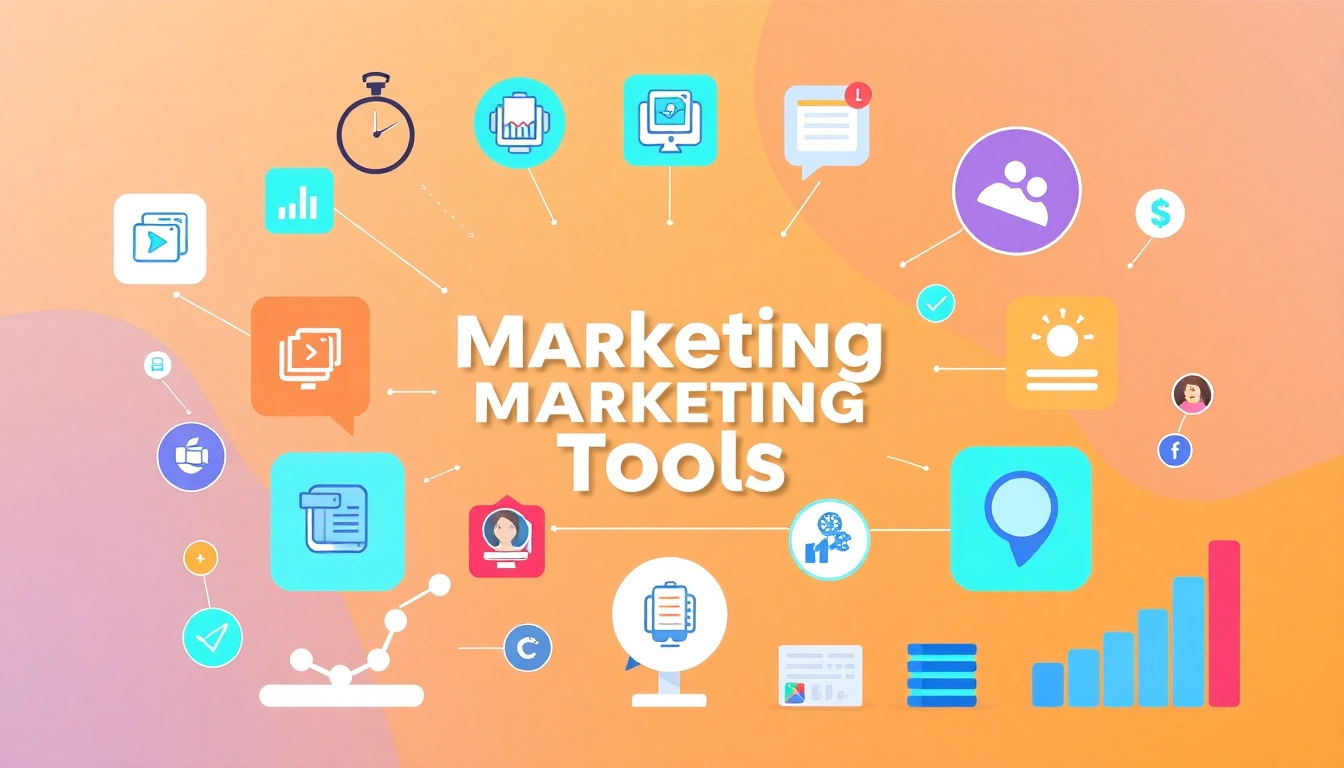Introduction to AI Marketing Tools
In the rapidly evolving landscape of digital marketing, organizations are increasingly turning to technology to enhance their capabilities. One of the most transformative technologies in recent years is artificial intelligence (AI), which is reshaping how marketers interact with customers and manage their workflows. Understanding AI marketing tools is critical for businesses aiming to maintain a competitive edge in today’s data-driven environment.
What are AI Marketing Tools?
AI marketing tools are software solutions that leverage machine learning and artificial intelligence to automate marketing tasks and optimize interactions with customers. These tools can analyze vast amounts of data, recognize patterns, and make predictions with incredible accuracy, enabling marketers to make informed decisions and drive engagement. Whether it’s automating email campaigns, personalizing content experiences, or analyzing customer behaviors, AI tools exist to empower marketers and streamline their efforts.
The Evolution of Marketing Technology
The marketing technology landscape has undergone significant shifts over the past two decades. The rise of the internet facilitated a transition from traditional marketing methods to digital. As the digital space became saturated, the challenge became not just reaching potential customers, but effectively engaging them. Early 2000s saw the introduction of customer relationship management (CRM) systems, followed by the emergence of software solutions for analytics and targeted advertising. In recent years, the advancement of AI technologies has opened a new frontier for marketers, spearheading innovations that enhance both strategy and execution.
Why AI Tools Matter for Modern Marketers
AI tools present transformative benefits for modern marketers. They enable deeper insights through data analytics, personalized marketing at an unprecedented scale, and enhanced productivity through automation. As customer expectations grow, businesses must adapt their approach, and those leveraging AI technologies can create more relevant, timely, and targeted marketing campaigns. Consequently, utilizing AI tools not only improves customer experience but also drives better business outcomes.
Key Features of Effective AI Marketing Tools
Automation and Efficiency Gains
One of the most significant advantages of AI marketing tools is automation. By automating repetitive tasks, marketers can focus on strategic planning and creative aspects of marketing. Tasks such as sending emails, managing campaigns, and reporting can be automated through AI, freeing up time for marketers to think creatively and innovate. For example, tools like HubSpot automate email marketing, giving marketers the freedom to craft better content and strategize for high engagement.
Data Analytics and Insights Generation
The ability to gather and analyze data is crucial for crafting effective marketing strategies. Advanced AI marketing tools can analyze customer data trends, segment audiences with precision, and generate actionable insights. Tools like Google Analytics and Datarama offer powerful analytics capabilities that help marketers understand customer behavior and trends, allowing for better-targeted strategies and maximized ROI.
Personalization at Scale
Personalization has become a critical component of successful marketing campaigns. AI tools facilitate the creation of personalized customer experiences at scale. By analyzing customer interactions and preferences, AI can help tailor content to individual users. This level of personalization not only enhances the customer experience but also increases conversion rates. For instance, platforms like Dynamic Yield leverage AI to serve personalized product recommendations based on user behavior.
Top AI Marketing Tools Reviewed
1. Tool A: Features and Benefits
One of the leading AI marketing tools is Jasper AI. Its primary features include content creation, SEO optimization, and personalized copy generation. Jasper uses natural language processing to create high-quality marketing copy that resonates with target audiences. The advantage of Jasper AI lies in its ability to produce content quickly, enabling brands to maintain a consistent voice and messaging across various platforms.
2. Tool B: Comparison with Competitors
Compared to alternatives like Copy.ai or Writesonic, Jasper AI stands out due to its extensive customization capabilities and advanced integration options with platforms like WordPress and HubSpot. While these competitors also offer similar content generation features, Jasper’s focus on high-quality outputs and user-friendly interface often results in better customer satisfaction and usability.
3. Tool C: User Experiences and Case Studies
A study conducted by a digital marketing agency showcased how using Jasper AI improved their content production efficiency by over 50%. Users reported reduced time spent brainstorming and drafting content, allowing them to focus on strategic insights and customer engagement. Testimonials from users emphasize the quality of output and creativity generated by Jasper, making it a favorite among marketers.
Implementing AI Marketing Tools in Your Strategy
Steps to Integrate AI into Existing Workflows
Integrating AI marketing tools into existing processes requires careful planning and execution. The following steps can guide businesses through this transition:
- Assess Your Needs: Identify specific areas within your marketing strategy where AI can add value. Analyze existing workflows and determine bottlenecks that AI can alleviate.
- Choose the Right Tools: Select AI tools that align with your needs and budget. Consider trial versions before committing fully to any solution.
- Train Your Team: Ensure your marketing team is equipped to leverage the new technology effectively. This often means providing training sessions or resources on how to utilize the tools.
- Monitor Performance: After implementation, closely monitor the results of using AI tools. Gather data on performance metrics to evaluate the impact on overall marketing strategies.
Measuring Performance and ROI
To determine the effectiveness of AI marketing tools, it is essential to establish KPIs (Key Performance Indicators). Metrics such as conversion rates, engagement levels, and cost-per-lead can provide insights into the success of campaigns powered by AI. Regular performance reviews can help in fine-tuning strategies and maximizing ROI.
Common Challenges and Solutions
While implementing AI marketing tools presents numerous benefits, challenges can arise. Some common hurdles include:
- Data Quality Issues: Ensure that data fed into AI systems is of high quality to avoid generating misleading insights. Clean and maintain your data regularly.
- Resistance to Change: Some team members may be hesitant to adapt to new technologies. Champion the benefits of AI and encourage a mindset shift within the team.
- Integration Difficulties: Ensure new AI tools integrate seamlessly with existing systems to prevent disruptions in workflows. Work with IT to strategize a smooth implementation process.
The Future of AI in Marketing
Emerging Trends and Technologies
The marketing landscape will continue to be reshaped by advancements in AI technology. Emerging trends include the use of predictive analytics to foresee customer behavior and the growth of voice and chat interfaces powered by AI. These innovations will provide new opportunities for marketers to create meaningful connections with their audiences and deliver personalized experiences that enhance customer satisfaction.
How to Stay Ahead in the AI Marketing Space
To maintain a competitive edge, marketers should stay updated on the latest AI innovations and emerging tools. Engaging with thought leaders in the industry through webinars, conferences, and newsletters can provide valuable insights. Additionally, regularly reviewing the performance of AI tools and adapting strategies based on outcomes will equip businesses to navigate the ever-evolving marketing landscape efficiently.
Conclusion and Action Steps
Adopting AI marketing tools is no longer a novelty but a necessity in today’s data-oriented business environment. By understanding their functionalities and learning how to implement them effectively, marketers can unlock the full potential of their campaigns. The next step for marketers is clear: evaluate your current processes, explore available AI tools, and take action to integrate AI into your marketing strategy to drive innovation and growth.



